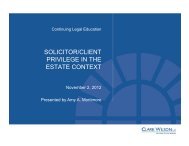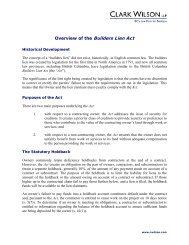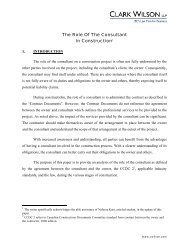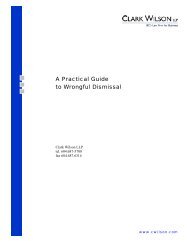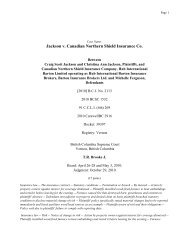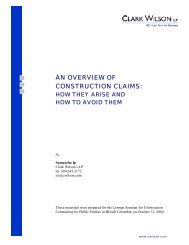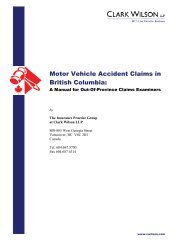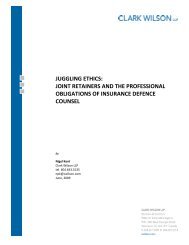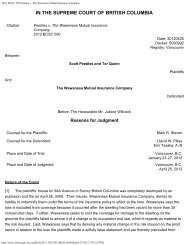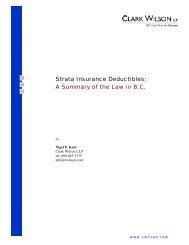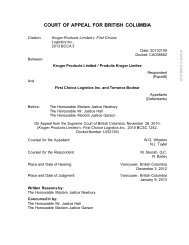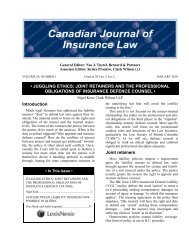in the supreme court of british columbia - Clark Wilson LLP
in the supreme court of british columbia - Clark Wilson LLP
in the supreme court of british columbia - Clark Wilson LLP
Create successful ePaper yourself
Turn your PDF publications into a flip-book with our unique Google optimized e-Paper software.
British Columbia Medical Association v. Aviva Insurance<br />
Company <strong>of</strong> Canada Page 24<br />
[70] I agree with <strong>the</strong> submission <strong>of</strong> counsel for BCMA that <strong>the</strong> bus<strong>in</strong>ess <strong>of</strong> BCMA<br />
<strong>in</strong>cludes <strong>the</strong> expression <strong>of</strong> different and oppos<strong>in</strong>g views and promot<strong>in</strong>g vigorous<br />
debate. It is possible for Dr. Wang to succeed aga<strong>in</strong>st <strong>the</strong> defendants without a<br />
f<strong>in</strong>d<strong>in</strong>g that <strong>the</strong> alleged defamation occurred outside <strong>the</strong> scope <strong>of</strong> <strong>the</strong> bus<strong>in</strong>ess <strong>of</strong><br />
BCMA, which <strong>in</strong>clude its governance and election processes.<br />
[71] F<strong>in</strong>ally, with respect to <strong>the</strong> third stage, <strong>the</strong> defamation plea is a properly<br />
pleaded, non-derivative claim that could potentially trigger <strong>in</strong>demnity if it were to<br />
succeed at trial. Accord<strong>in</strong>gly, I conclude that Aviva is required under <strong>the</strong> terms <strong>of</strong> its<br />
policies to provide a defence to both BCMA and <strong>the</strong> Individuals.<br />
2011 BCSC 1399 (CanLII)<br />
Conduct <strong>of</strong> <strong>the</strong> Defence<br />
[72] In general, when <strong>the</strong> <strong>in</strong>surer defends aga<strong>in</strong>st a claim it has <strong>the</strong> right to control<br />
<strong>the</strong> defence, <strong>in</strong>clud<strong>in</strong>g <strong>the</strong> right to appo<strong>in</strong>t and <strong>in</strong>struct counsel. However, <strong>the</strong> right <strong>of</strong><br />
<strong>the</strong> <strong>in</strong>surer to control <strong>the</strong> defence is not absolute (see Brockton (Municipality) v.<br />
Frank Cowan Co. (2002), 57 O.R. (3d) 447 (Ont. C.A.) [Brockton]. In Brockton,<br />
Goudge J.A., referenc<strong>in</strong>g <strong>the</strong> judgment <strong>in</strong> Zurich <strong>of</strong> Canada v. Renaud & Jacob,<br />
[1996] R.J.Q. 2160 (C.A.), stated <strong>the</strong> test to be, at para. 41:<br />
...that <strong>the</strong> potential tension which <strong>in</strong>heres <strong>in</strong> <strong>the</strong> relationship between <strong>the</strong><br />
<strong>in</strong>surer and <strong>the</strong> <strong>in</strong>sured and which is manifested by <strong>the</strong> reservation <strong>of</strong> rights<br />
by <strong>the</strong> <strong>in</strong>surer is not per se sufficient to require <strong>the</strong> <strong>in</strong>surer to surrender<br />
control <strong>of</strong> <strong>the</strong> defence. It would too quickly cost <strong>the</strong> <strong>in</strong>surer <strong>the</strong> right it<br />
contracted for. Ra<strong>the</strong>r, <strong>the</strong> focus must be on <strong>the</strong> mandate given by <strong>the</strong> <strong>in</strong>surer<br />
to <strong>the</strong> counsel it appo<strong>in</strong>ts to conduct <strong>the</strong> defence. Do <strong>the</strong> circumstances <strong>of</strong><br />
<strong>the</strong> particular case create a reasonable apprehension <strong>of</strong> conflict <strong>of</strong> <strong>in</strong>terest if<br />
that counsel were to act for both <strong>the</strong> <strong>in</strong>surer and <strong>the</strong> <strong>in</strong>sured <strong>in</strong> defend<strong>in</strong>g <strong>the</strong><br />
action? If <strong>the</strong> <strong>in</strong>surer puts counsel <strong>in</strong> a position <strong>of</strong> hav<strong>in</strong>g conflict<strong>in</strong>g<br />
mandates it must surrender control <strong>of</strong> <strong>the</strong> defence to an <strong>in</strong>sured who wishes<br />
to reta<strong>in</strong> its own counsel paid for by <strong>the</strong> <strong>in</strong>surer. [Emphasis added.]<br />
[73] In Brockton, <strong>the</strong> Court noted that <strong>the</strong> fact that <strong>the</strong> <strong>in</strong>surer had reserved rights<br />
would not <strong>in</strong> itself be sufficient to give rise to a conflict <strong>of</strong> <strong>in</strong>terest. Ra<strong>the</strong>r, as noted at<br />
para. 42, cit<strong>in</strong>g with approval <strong>the</strong> California Court <strong>of</strong> Appeal decision <strong>in</strong> Foremost<br />
Insurance Co. v. Wilks, 253 Cal. Rptr. 596, (1988):<br />
[I]n Foremost Insurance Co. v. Wilks, 253 Cal. Rptr. 596, (1988), <strong>the</strong><br />
California Court <strong>of</strong> Appeal made clear that not every case where <strong>the</strong> <strong>in</strong>surer



